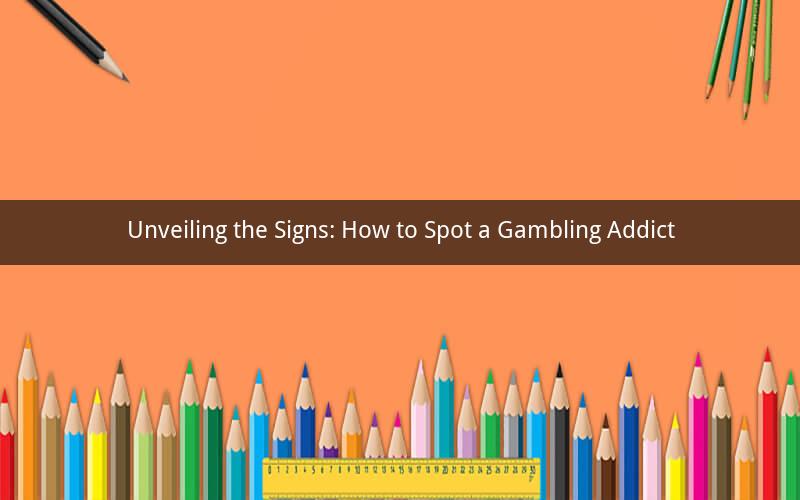
Introduction:
Gambling addiction is a serious issue that affects millions of people worldwide. Identifying the signs of gambling addiction is crucial in providing timely support and intervention. In this article, we will delve into the key indicators that can help you spot a gambling addict.
1. Unusual Behavior Patterns:
One of the most prominent signs of gambling addiction is the development of unusual behavior patterns. These may include:
a. Secretive Behavior: A gambling addict may become increasingly secretive about their activities, often lying about their whereabouts and spending habits.
b. Missing Work or School: If someone is struggling with gambling addiction, they may start missing work or school regularly due to their gambling activities.
c. Changes in Sleep Patterns: Insomnia or excessive sleeping can be a result of the stress and anxiety caused by gambling addiction.
2. Financial Struggles:
Gambling addiction often leads to significant financial difficulties. Look out for the following signs:
a. Unexplained Financial Shortfalls: A gambling addict may frequently experience unexpected financial shortfalls, often due to money spent on gambling.
b. Borrowing Money: They may borrow money from friends, family, or financial institutions to fund their gambling habits.
c. Selling Possessions: To sustain their gambling addiction, a person may start selling valuable possessions or items they once cherished.
3. Emotional and Psychological Symptoms:
Gambling addiction can have a profound impact on a person's emotional and psychological well-being. Here are some indicators to watch out for:
a. Mood Swings: A gambling addict may experience rapid mood swings, ranging from elation when winning to despair when losing.
b. Anxiety and Depression: The stress and anxiety associated with gambling addiction can lead to symptoms of anxiety and depression.
c. Guilt and Remorse: After a losing streak, a gambling addict may feel guilty and remorseful, leading to feelings of shame and isolation.
4. Social and Family Issues:
Gambling addiction can strain relationships and disrupt family life. Look for the following signs:
a. Isolation: A gambling addict may withdraw from friends and family, preferring to spend time alone or with other gamblers.
b. Arguments and Conflict: Financial struggles and emotional turmoil can lead to frequent arguments and conflicts within the family.
c. Divorce and Separation: In severe cases, gambling addiction can lead to the breakdown of relationships and even divorce or separation.
5. Physical Symptoms:
Gambling addiction can also manifest in physical symptoms. Pay attention to the following signs:
a. Tiredness and Fatigue: The stress and anxiety associated with gambling addiction can lead to chronic tiredness and fatigue.
b. Nervous Tics: Some individuals may exhibit nervous tics, such as fidgeting or nail-biting, due to the stress caused by gambling addiction.
c. Health Complications: In extreme cases, gambling addiction can lead to health complications, such as heart disease or stroke.
Frequently Asked Questions:
Q1: How can I help someone who I suspect is a gambling addict?
A1: Offer your support and encourage them to seek professional help. Encourage them to attend counseling sessions or support groups and provide a listening ear during their recovery journey.
Q2: Is it possible for someone to overcome a gambling addiction?
A2: Yes, it is possible for someone to overcome a gambling addiction with the right support, treatment, and determination. Recovery is a challenging process, but many individuals have successfully overcome their addiction.
Q3: Can gambling addiction be treated?
A3: Yes, gambling addiction can be treated. Treatment options include counseling, therapy, support groups, and in some cases, medication. The most effective approach often involves a combination of these methods.
Q4: How can I prevent gambling addiction in myself or someone I care about?
A4: Set limits on your gambling activities, be aware of the signs of addiction, and seek support if you feel you are at risk. Educate yourself about the dangers of gambling and stay informed about responsible gambling practices.
Q5: Is there a genetic component to gambling addiction?
A5: Yes, research suggests that there is a genetic component to gambling addiction. If you have a family history of addiction, you may be at a higher risk of developing a gambling addiction yourself. Being aware of this risk can help you take proactive steps to prevent or manage addiction.